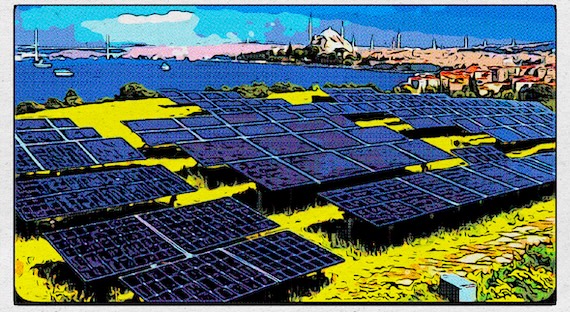Ann Arbor (Informed Comment) – One of the paradoxes of human-made climate change is that as we heat up the planet by burning gasoline, coal and fossil gas, it makes the summers hotter. These torrid months impel people to run the air conditioner nonstop, which requires burning more coal or fossil gas, which causes it to get hotter. It is a vicious circle.
Türkiye is suffering from increasing summer heat waves, especially in the western part of the country, creating dramatic increases in electricity use from ACs.
But the country has also showed that there is an alternative to this constant ratcheting up of the temperature. According to the energy think tank Ember, 2/3s of the increased demand for electricity, mostly caused by the sweltering temperatures of the summer of 2024, was met by new solar installations. Turkish energy production from solar was up 40% in the first half of 2024, year over year.
By putting in new solar installations, Türkiye in 2024 avoided 16 gigawatts of dirty electricity produced by fossil fuels. All of those fossil fuels would have been imported, since Türkiye is poor in these resources, resulting in a big import bill. That expenditure was also avoided.

“Solar Golden Horne,” Digital, Dream / Dreamland v3 /Clip2Comic, 2024 >
Türkiye reached 16 gigawatts of installed solar capacity this summer, which is 14% of the country’s installed power capacity. It has already risen to 18.7 gigawatts in December. The government wants to increase solar capacity to 22.6 gigawatts in the next twelve months.
A little over half of the country’s electricity is produced by coal-fired and fossil gas-fired plants on a year-round basis, but the government has plans to invest heavily in renewables toward a zero-carbon electric grid over the next little over a decade. It plans 89 gigawatts of new solar and wind capacity by 2035, with plans to invest $108 billion in the transformation.
Greening the Turkish grid is made difficult not only by the extra air conditioning use in increasingly hot summers, but also by the economy’s continued expansion. It is one of the fastest-growing countries in the world economically, which creates vast additional electricity demand.
Türkiye is also going for 14.8 gigawatts of wind generation by the end of next year.
Turkish electric vehicle sales are also surging by 39% this year. The country produces the Togg, for which it is seeking increased Chinese partnerships, and plans to export it to Europe starting next year. The Togg is helping drive EV sales domestically and creating local jobs, showing how green technology can help power clean industrialization.
Türkiye, a member of NATO, is the world’s 17th largest economy, making it a member of the G20, with a projected 2024 nominal GDP of $1.3 trillion. It has a population of 87 million, just a little bit more than that of Germany.


 © 2025 All Rights Reserved
© 2025 All Rights Reserved